Organization and economics of healthcare
Organization and economics of healthcare – new bachelor’s studies offered by the Institute of Public Health JU MC
• Why is this topic so important?
The healthcare system faces many problems: an ageing population, chronic diseases, environmental pollution, and modern but expensive methods of diagnosis and treatment.
Despite the fact that healthcare spending is increasing, it is still difficult to follow the growing needs of the population. A better use of available resources: money, people and equipment can be a solution. Therefore, skills and knowledge in the field of organization and economics of healthcare are becoming more and more necessary on the labor market.
• Who is this course for?
The course is addressed to those who want to be prepared to work in various institutions of the health sector after their bachelor’s studies, wherever decisions and actions are taken regarding the use of available funds and resources.
This is a bachelor’s degree, which can then be followed by a master’s degree, e.g. in public health or in the fields of economics, management, organization and public administration.
• What makes us different?
We offer students a new and interesting program of study, concerning many economic, organizational, legal and management tools to improve the effectiveness and efficiency of the healthcare system.
The program is based on experience and good practices in Polish and international healthcare. We are proud to present a new, unique combination of general knowledge, usually offered by classical management and administration studies, with professional knowledge and full understanding of the specificity of the healthcare sector.
We have a very experienced and interdisciplinary academic staff, significant scientific achievements and the longest tradition in teaching public health in Central and Eastern Europe – this creates an excellent background for the organization and economics of healthcare.
We offer a total of 12 weeks of internship in many institutions, such as:
• Healthcare Quality Monitoring Centre,
• Health Technology Assessment Agencies,
• Emergency Notification Centres,
• public administration bodies (ministries, health departments in offices),
• public and private insurance companies,
• National Health Fund,
• non-governmental organizations (NGOs),
• offices of international organizations (WHO Poland) and many others.
Importantly, our students can also participate in international exchange within the Erasmus Plus programme and go to universities in Germany, the Netherlands, Denmark, Norway or Lithuania for a semester or a year.
• Where can you work after the organization and economics of healthcare?
The acquired knowledge and skills will make it possible to take up employment in small and large institutions, including:
• institutions responsible for international cooperation on the organization and functioning of healthcare systems (WHO, EU agencies) and entities operating within them,
• private companies from the medical industry looking for people who have an overview of the overall functioning of the healthcare system
• hospitals, clinics and other facilities – in economic and financial, management, organizational and administrative departments,
• health technology assessment agencies in analytical departments
• government administration and government agencies, health inspections and other health-related supervisory and control bodies,
• paying institutions (public and private insurance),
• institutions engaged in prevention and health promotion (in healthcare administrative offices, health service providers, NGOs, etc.).
 FACEBOOK
FACEBOOK INSTAGRAM
INSTAGRAM X
X LINKEDIN
LINKEDIN YOUTUBE
YOUTUBE